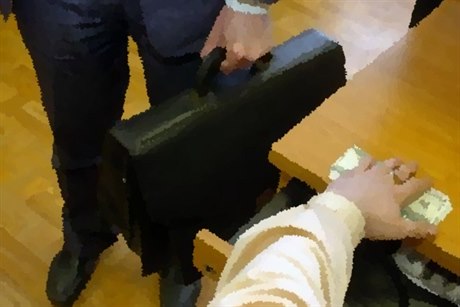A first attempt to map out the possibilities and weak points of the Czech Republic’s administrative framework to tackle corruption has been made by the Czech branch of graft watchdog Transparency International (TI).
The group published the first every “Study of National Integrity,” an attempt to put individual aspects of the administration and community under the spotlight and evaluate how well they are positioned to tackle corruption and how far their potential lives up or falls short in practice.
“In the public perception, corruption is connected with various scandals, but these could not be possible if there was not in place some system that did not make them possible or prevent them,” commented Radim Bureš, one of the authors of the 250-page study, partly funded by the European Commission, which makes for pretty depressing reading with regard to the main pillars of the Czech state that could combat corruption.
“The potential [for combating corruption] of the institutions that were studied is great, but most of the institutions do not fulfill the role adequately,” TI commented in a statement.
‘The potential [for combating corruption] of the institutions that were studied is great, but most of the institutions do not fulfill the role adequately.’
While most institutions have the necessary foundations for playing an anti-corruption role, such as resources and internal rules, there is frequently a wide gap between the potential on paper and practice in reality, the study found. In some instances, such as the independence of the state administrative system from political pressure, the basic rules have not yet been put in place, it found.
The “Study of National Integrity” pinpointed the Czech state prosecution system, police, and state administration as the weakest links in the state framework from the perspective of their ability to resist corruption and deal with it. These are given overall marks of 40, 43, and 40, respectively, out of 100. “The weakest elements of the system as regards national integrity are the state prosecution service and state administration’s ability to follow up after the police,” TI added.
Ironically, while the weakest elements of the state system are often the most crucial to the anti-corruption fight, those which were praised for their internal procedures and anti-corruption efforts often have a fairly peripheral role, the study found.
“The institutions that showed the highest levels of internal integrity, such as the ombudsman, Supreme Audit Office (NKÚ) and also the courts, did not have the necessary influence on the healthy functioning of society,” TI said.
With regard to the weakest links, the study found the state prosecution system was bound by its lack of independence from political and other pressure and made no attempt to shake off those inhibitions. It was only given a 25 out of 100 score for its main roles of investigating corruption and supervision of the executive.
The same low final marks for pursuing corruption applied to the police. In this case it was also found to have little independence, scoring 50 out of 100 for theoretical independence but only 25 out of 100 in reality. Police also fell well short of living up to their high theoretical high levels of accountability under internal rules, 75 out of 100, with the score in practice down to 25.
With laws guaranteeing civil servants immunity from political pressure frequently promised but never delivered, the Czech administration scored a rare zero for independence. It also fell down badly on accountability. With regard to its fulfillment of overall anti-corruption roles, which includes supervision of the system for public tenders, cooperation with private and public sector in anti-corruption initiatives and public education, it scored 33 out of 100.
The study gave the highest mark to the ombudsman, 90 out of 100, who was found to fulfill his role to the full in nearly all departments examined.
The study gave the highest mark to the ombudsman, 90 out of 100, who was found to fulfill his role to the full in nearly all departments examined. The problem is that the role of last stop for aggrieved citizens against the administration is a relatively minor one.
A good report was also given to the supreme audit office, 76 out of 100, with the same caveat that it has a relatively minor role in the whole system. The government agreed moves to widen its remit in April, for example allowing it to examine local and regional authorities, but stopped short of allowing it to probe state companies. The audit office’s reports are delivered to the government, but it has no obligation to follow up on them.
Other aspects of society that could play a bigger role in the fight against corruption, such as the media, political parties and NGOs were given mediocre overall scores of 54, 47 and 56, respectively, out of 100. Investigative journalism was in particular highlighted for its absence — though the media did deliver basic information to the public about cases of corruption and the workings of state machinery.
The study said these three sectors, together with the parliament, president, and business, were characterized as having large amounts of independence within the system but little real responsibility. This usually resulted in a big shortfall between their potential to combat corruption and the results obtained. The police, state administration, state prosecution system were characterized by low independence and high responsibility, it added.
Petr Jansa, who took the lead in coordinating the study, described the outlook for changes in the Czech environment for corruption as: “Quite pessimistic, citizens do not have a lot to look forward to.”
TI’s Czech director David Ondráčka said the center-right coalition of prime minister Petr Nečas (Civic Democrat, ODS) needed to prioritize its promised raft of anti-corruption measures because it had one year in reality to push through changes before the government became distracted by the next elections to the lower house of parliament.
The study was written with the help of various public figures, such as Oldřich Martinů, the former head of the Czech Police before he stepped down at the end of 2010, and Luděk Niedermayer, a former deputy-governor of the Czech National Bank (ČNB).
Follow-up studies on specific sectors with specific recommendations should follow over the next year but a repeat of the whole study would probably be premature before two or three years, Ondráčka said.




